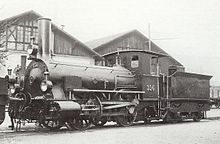locomotive
Jump to navigation
Jump to search
English[edit]

Etymology[edit]
From French locomotif, from Latin locō (literally “from a place”) (ablative of locus (“place”)) + Vulgar Latin mōtivus (“moving”) (see motive).
In the rail transport sense ellipsis of locomotive (steam) engine, attested from 1814.[1]
Pronunciation[edit]
- (Gen) IPA(key): /ˌloʊkəˈmoʊtiv/
- (Received Pronunciation) IPA(key): /ˌləʊkəʊˈməʊtiv/
Audio (US) (file)
Noun[edit]
locomotive (plural locomotives)
- (rail transport) The power unit of a train that pulls the coaches or wagons.
- Hypernym: rolling stock
- (rare) A traction engine.
- (slang) A cheer characterized by a slow beginning and a progressive increase in speed.
- (archaic) Any of various early road vehicles, steam-powered, etc., forerunners of the modern car.
- (economics) A country which drives the world economy by having a high level of imports, such as the United States.
Synonyms[edit]
Derived terms[edit]
Translations[edit]
self-propelled vehicle that runs on rails
|
Adjective[edit]
locomotive (comparative more locomotive, superlative most locomotive)
- Of or relating to locomotion.
- Of or relating to the power unit of a train which does not carry passengers or freight itself.
- Moving, or capable of motion.
Translations[edit]
relating to locomotion
|
moving — see moving
References[edit]
- ^ Douglas Harper (2001–2024) “locomotive”, in Online Etymology Dictionary.
French[edit]
Pronunciation[edit]
Adjective[edit]
locomotive
Noun[edit]
locomotive f (plural locomotives)
Derived terms[edit]
Further reading[edit]
- “locomotive”, in Trésor de la langue française informatisé [Digitized Treasury of the French Language], 2012.
Italian[edit]
Noun[edit]
locomotive f
- plural of locomotiva
Categories:
- English terms derived from Proto-Indo-European
- English terms derived from the Proto-Indo-European root *mew-
- English terms derived from French
- English terms derived from Latin
- English terms derived from Vulgar Latin
- English ellipses
- English 4-syllable words
- English terms with IPA pronunciation
- English terms with audio links
- English lemmas
- English nouns
- English countable nouns
- en:Rail transportation
- English terms with rare senses
- English slang
- English terms with archaic senses
- en:Economics
- English adjectives
- English terms with quotations
- French 4-syllable words
- French terms with IPA pronunciation
- French terms with audio links
- French terms with homophones
- French non-lemma forms
- French adjective forms
- French lemmas
- French nouns
- French countable nouns
- French feminine nouns
- fr:Rail transportation
- Italian non-lemma forms
- Italian noun forms